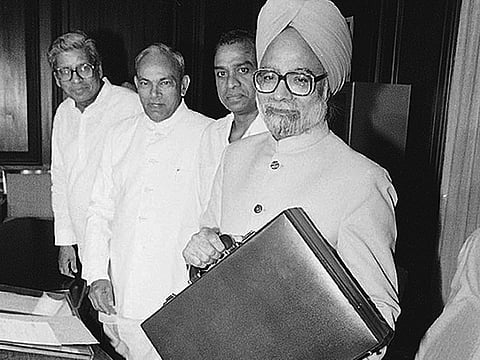Why liberalisation was India's second awakening
Liberalising of the Indian economy has transformed the nation into an economic powerhouse

It was a monsoon evening and my mother was sitting in front of the television, a rare occasion in our house. She was listening to the Indian finance minister spell out his plan to avoid an imminent balance of payments crisis and bring the 67 metric tons of gold back that had been sent to London and Zurich as collateral for a $600-million (Dh2.2-billion) loan from the International Monetary Fund to cover essential imports.
Opening up the economy was the only answer, the economist Manmohan Singh declared. People all over the country debated the move, but agreed they didn’t care whether Coca-Cola became available again; they wanted rampant inflation curtailed. And they wanted their gold back.
The TV was on regularly after that, particularly late at night, when I was studying for my school-leaving board exams: I’d take breaks between revision units to watch Jasmine Bharucha and Rock Machine and Michael Jackson, and improbably, Deee-Lite, thrilled at having access to music in a language I could understand.
We all have coming-of-age moments and MTV Asia was one of mine. (My joy was compounded when I began working for the channel years later, straight out of university.) I would watch music TV in the afternoon when I came home from school, before dinner, and again late at night between study breaks while everyone else had gone to bed, staying close to the set in case I needed to switch it off (in the early nineties, nobody had remotes).
It was my friend, my succour, my guilty pleasure — a symbol of a new, international India, and of the MTV generation.
Singh’s landmark budget speech, 26 years ago last month, may well be a generation away but its ramifications have transformed the Asian giant. Despite fierce resistance from both the ruling Congress and the opposition parties, Singh and his Prime Minister boss, P.V. Narasimha Rao, opened up the nation’s markets, welcomed foreign investment, reduced import tariffs, slashed taxes and unleashed runaway economic growth.
Poverty alleviated
Today, not only can the middle classes use their smartphones as TV remotes, but they now tell NRI relatives not to bring anything back from Dubai or Sheffield or Newark because everything’s available at the corner shop. With cash reserves of nearly $400 billion (as against $1.2 billion in January 1991), India now ranks seventh among the world’s nations by absolute GDP. Perhaps most impressive, an astonishing 133 million people have been lifted out of absolute poverty — and yes, in 2009, the country bought 200 metric tons of gold from the IMF to diversify its assets.
No other move since the Indian Independence Act of 1947 have had such a strong impact; none has altered our lives so deeply. As we look back over 70 years of independence in this Defining Moments issue, I am inspired by the finance minister’s rousing words from that 1991 address: “As Victor Hugo once said, ‘No power on earth can stop an idea whose time has come.’ I suggest to this august House that the emergence of India as a major economic power in the world happens to be one such idea. Let the whole world hear it loud and clear. India is now wide awake. We shall prevail. We shall overcome.”
In adversity, we find our strength.
Happy Independence Day!



